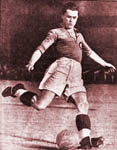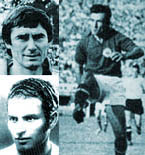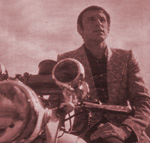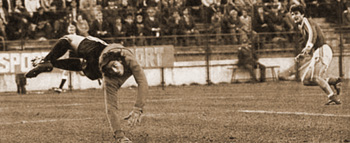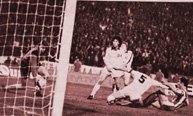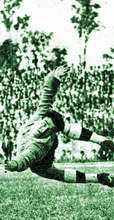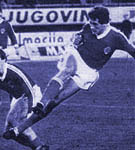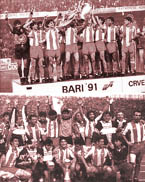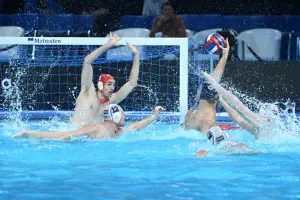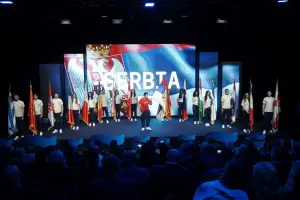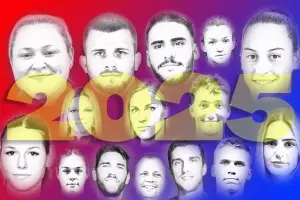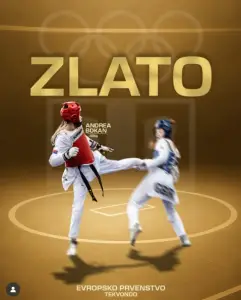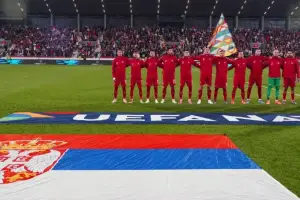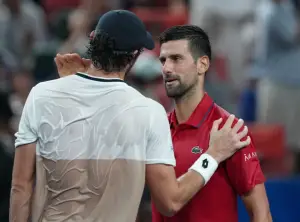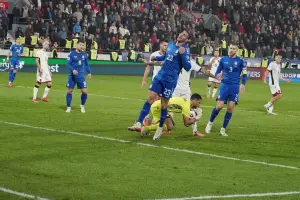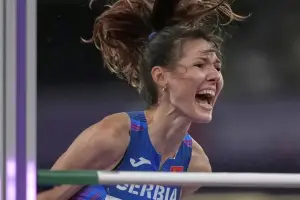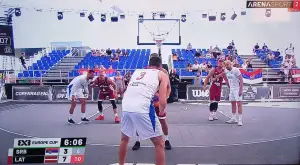Q:
A:
Gooooaaaaal!
4 March 2004
From the history of Yugoslavia's football
First night game
The first night game in Serbia and Yugoslavia was played in Belgrade on June 22nd 1932 between the Parisian champion "Racing" and the Belgrade champion "Yugoslavia". There were 84 1000 W bulbs at the stadium. The game drew much attention and it was attended by a record number of spectators - 12,000.
"Yugoslavia" won the match by 3:0.
"Yugoslavia" won the match by 3:0.
Semifinalists of the First World Cup
The football world met the Yugoslav masters of the ball in 1930 at the First World Championship in Uruguay.
Yugoslav football players arrived to Montevideo by ship, after 18 days cruise. The only training they had was running around the board. Exhausted from the trip, and having no real trainings, the Yugoslavs created sensation by winning the Brazilian national team with 2:1. Aleksandar Tirnanic, who gave the first shot for Yugoslav team on world championships, entered the history.
Encouraged by great success, the "blue" declassed Bolivia with 4:0 and placed themselves into semifinals where they played a match versus host. In carnival atmosphere, in front of 100.000 supporters, the Yugoslavs announced another sensation with goal scored by Sekulic. But, the Uruguay players made tie in a short time scoring after that five additional hits, making final result 6:1. The crucial moment of the match happened at the result 1:1 when in one attack, after the ball went out-of bounds area, a police officer turned the ball back to the field. Uruguay didn't miss the chance to score the leading goal. The protests of the Yugoslav players were futile - the hit is recognized and Yugoslavia is defeated.
However, a live remembrance on Yugoslav team remained. The Yugoslav team had the best standing among the European teams in World Championship in Uruguay. The generation of Jaksic, Tirnanic, Bek, Marjanovic, Vujadinovic, Sekulic informed the world for the first time with knowledge of Yugoslav players.
Yugoslav football players arrived to Montevideo by ship, after 18 days cruise. The only training they had was running around the board. Exhausted from the trip, and having no real trainings, the Yugoslavs created sensation by winning the Brazilian national team with 2:1. Aleksandar Tirnanic, who gave the first shot for Yugoslav team on world championships, entered the history.
Encouraged by great success, the "blue" declassed Bolivia with 4:0 and placed themselves into semifinals where they played a match versus host. In carnival atmosphere, in front of 100.000 supporters, the Yugoslavs announced another sensation with goal scored by Sekulic. But, the Uruguay players made tie in a short time scoring after that five additional hits, making final result 6:1. The crucial moment of the match happened at the result 1:1 when in one attack, after the ball went out-of bounds area, a police officer turned the ball back to the field. Uruguay didn't miss the chance to score the leading goal. The protests of the Yugoslav players were futile - the hit is recognized and Yugoslavia is defeated.
However, a live remembrance on Yugoslav team remained. The Yugoslav team had the best standing among the European teams in World Championship in Uruguay. The generation of Jaksic, Tirnanic, Bek, Marjanovic, Vujadinovic, Sekulic informed the world for the first time with knowledge of Yugoslav players.
Kings among scorers
According to the statistics, Slobodan Santrac, a football player who spent most of his career playing for "OFK Beograd", is the top scorer of Yugoslav football and one of the major goal getters of world's football.
Santrac is convincingly the best scorer in the Yugoslav championships, with 218 goals scored.
The amount of scored goals in his entire career (1,301) puts Santrac on the top of world's list of the best goal getters of all times, in front of Pele, who, in his entire career, scored "only" 1,281 goals.
Interestingly, if we count all the minutes Santrac spent in the game, he played only one game for the best Yugoslav national team.
According to the goals scored in the national selections of all categories, the absolute king among scorers is Todor Veselinovic with 51 goals scored in 57 games.
Blagoje - Mosa Marjanovic, apart from being the first Yugoslav player who played 50 games for the national team, is the best scorer in the championships that took place before the WW II, with the total of 95 goals scored (three times the scorer of championship).
Santrac is convincingly the best scorer in the Yugoslav championships, with 218 goals scored.
The amount of scored goals in his entire career (1,301) puts Santrac on the top of world's list of the best goal getters of all times, in front of Pele, who, in his entire career, scored "only" 1,281 goals.
Interestingly, if we count all the minutes Santrac spent in the game, he played only one game for the best Yugoslav national team.
According to the goals scored in the national selections of all categories, the absolute king among scorers is Todor Veselinovic with 51 goals scored in 57 games.
Blagoje - Mosa Marjanovic, apart from being the first Yugoslav player who played 50 games for the national team, is the best scorer in the championships that took place before the WW II, with the total of 95 goals scored (three times the scorer of championship).
Tampere Drama
On an Olympic football tournament in Helsinki in 1952, Yugoslav national team defeated India in the first match with a record 10-1. Interestingly, apart from the score, certain players of the Indian team were barefooted.
The second game against USSR was remembered in history a one of the most dramatic ever played by the Yugoslav team. On June 20th 1952 in Tampere, in front of some 17,000 spectators, Yugoslav team led by 5-1 some 15 minutes before the end, when the Soviet team managed to score a goal. The result on the display hasn't even changed, and it was 5-3!
Yugoslav players began to panic, the fanatic rivals took advantage of it and scored the forth goal, launching a real drama at the end of the match.
During several last minutes of the match, the ball hardly left the Yugoslav penalty box. Vladimir Baera magnificently turned several Soviet shots away, and, when it seamed that he would eventually ensure their victory, in the last minute the ball ended up behind his back - 5-5!
Since the match ended without a winner, they played another one. The Soviet team led by 1-0, but the Yugoslav team, although obviously depressed due to easily missed opportunity in the first match, proved to be better and won with 3-1. Yugoslav national team also defeated the German (3-1) in the semi-finals, but lost the match against Hungary (0-2), headed by Puskas and Kocis, and won a silver medal.
The second game against USSR was remembered in history a one of the most dramatic ever played by the Yugoslav team. On June 20th 1952 in Tampere, in front of some 17,000 spectators, Yugoslav team led by 5-1 some 15 minutes before the end, when the Soviet team managed to score a goal. The result on the display hasn't even changed, and it was 5-3!
Yugoslav players began to panic, the fanatic rivals took advantage of it and scored the forth goal, launching a real drama at the end of the match.
During several last minutes of the match, the ball hardly left the Yugoslav penalty box. Vladimir Baera magnificently turned several Soviet shots away, and, when it seamed that he would eventually ensure their victory, in the last minute the ball ended up behind his back - 5-5!
Since the match ended without a winner, they played another one. The Soviet team led by 1-0, but the Yugoslav team, although obviously depressed due to easily missed opportunity in the first match, proved to be better and won with 3-1. Yugoslav national team also defeated the German (3-1) in the semi-finals, but lost the match against Hungary (0-2), headed by Puskas and Kocis, and won a silver medal.
Missed opportunity of talented generation
In the European Champions' Cup final match 1966 at Haysel stadium in Brussels, team of Partizan Belgrade - a generation of famous 'babies', leading by goalkeeper Soskic, Jusufi, Vasovic, Galic - met with Real Madrid, which was only a shadow of a team that, with Di Stefano, Puskas, Kopa and Gento, won five successive European Champions' Cup titles in the period between 1956 and 1960.
Real was harmless at the beginning, Partizan was more concrete and took a lead through Vasovic. Later on during the match, Amancio scored the first goal for Real, while Serena by second goal used total confusion of the rival. The "kings" club from Madrid provided itself a title of the strongest and most respected European club's competition for the sixth time.
It was the greatest and in the same the last opportunity of talented generation of Partizan to confirm its domination, not only in Yugoslav, but also in the European football. A great number of players of Belgrade team left the club at the end of the season, and Velibor Vasovic, who scored the only goal in the final match, few years later felt the satisfactory when he received the European Champions' Cup trophy as a captain of Dutch team Ajax.
Real was harmless at the beginning, Partizan was more concrete and took a lead through Vasovic. Later on during the match, Amancio scored the first goal for Real, while Serena by second goal used total confusion of the rival. The "kings" club from Madrid provided itself a title of the strongest and most respected European club's competition for the sixth time.
It was the greatest and in the same the last opportunity of talented generation of Partizan to confirm its domination, not only in Yugoslav, but also in the European football. A great number of players of Belgrade team left the club at the end of the season, and Velibor Vasovic, who scored the only goal in the final match, few years later felt the satisfactory when he received the European Champions' Cup trophy as a captain of Dutch team Ajax.
Dragan Dzajic - football legend
Dragan Dzajic holds the absolute record in the number of matches played in the Yugoslav national team - 85. He was a long-lasting captain of the National Team and scored 23 goals. The last game he played for the national team, was the one against Argentina in 1979 in Belgrade (Yugoslavia won 4-1).
Played once in the World Cup - in Germany 1974 when Yugoslavia won 7th place. With the national team he won the title of the European runner-up in 1968 in Rome.
He was the player of FC Red Star from Belgrade and SEC Bastia (France). In the period 1961 - 1975, his score was 590 matches, 287 goals in Red Star, five titles of the National Champion and four trophies of the National Cup. After two seasons in Bastia he returned to Red Star where he played in the 1977/78 season.
Played five times in FIFA and UEFA selections. According to many polls conducted so far, Dragan Dzajic is the best football player Yugoslavia ever had and will be remembered as one of the best left wings in the world's football. The climax of his career was his performance in the semi-final game of the Cup of Nations against the national team of England, then World Champion, in 1968 in Rome, in which Yugoslavia won 1-0. Dzajic has, in the manner of greatest football experts, outwitted the experienced Bobby Moore, and scored, leaving the goalkeeper, Gordon Banks, quite helpless.
After his playing career Dzajic became the technical director of Red Star Belgrade giving on that position a remarkable contribution to the great achievements of his club, the most important of which are the titles of the European Championship and the Winner of the Intercontinental Cup.
Played once in the World Cup - in Germany 1974 when Yugoslavia won 7th place. With the national team he won the title of the European runner-up in 1968 in Rome.
He was the player of FC Red Star from Belgrade and SEC Bastia (France). In the period 1961 - 1975, his score was 590 matches, 287 goals in Red Star, five titles of the National Champion and four trophies of the National Cup. After two seasons in Bastia he returned to Red Star where he played in the 1977/78 season.
Played five times in FIFA and UEFA selections. According to many polls conducted so far, Dragan Dzajic is the best football player Yugoslavia ever had and will be remembered as one of the best left wings in the world's football. The climax of his career was his performance in the semi-final game of the Cup of Nations against the national team of England, then World Champion, in 1968 in Rome, in which Yugoslavia won 1-0. Dzajic has, in the manner of greatest football experts, outwitted the experienced Bobby Moore, and scored, leaving the goalkeeper, Gordon Banks, quite helpless.
After his playing career Dzajic became the technical director of Red Star Belgrade giving on that position a remarkable contribution to the great achievements of his club, the most important of which are the titles of the European Championship and the Winner of the Intercontinental Cup.
Karasi's goal in the last seconds
To ensure the play-off match against Spain in order to participate in the 10th World Cup in Germany in 1974, the Yugoslav national football team needed a win with a two goals difference in the game against Greece in Athens.
The Yugoslavs started the match against the Greeks well and led by 2-0, but luck turned its back on them - they received two goals and lost one player. In these circumstances they should have scored two more goals against the energetic and dynamic hosts, but manage in not receiving any.
In the second half, the host decided to go for all or nothing. A spark of hope appeared when Yugoslavia lead by 3-2. However, there was less and less time, and the World Cup seamed farther and farther… Minutes passed by, and the last seconds of the 90th minute started to elope, when in the Greek penalty box Stanislav Karasi volleyed the ball into the net. As soon as the host players started off from the center, the referee marked the end of the match, and the Yugoslavs were able to celebrate a major triumph brought them by Karasi, a new national hero.
A few months later, in the play off match, Yugoslavia defeated Spain, 1-0, and qualified for the World Cup in Germany.
The Yugoslavs started the match against the Greeks well and led by 2-0, but luck turned its back on them - they received two goals and lost one player. In these circumstances they should have scored two more goals against the energetic and dynamic hosts, but manage in not receiving any.
In the second half, the host decided to go for all or nothing. A spark of hope appeared when Yugoslavia lead by 3-2. However, there was less and less time, and the World Cup seamed farther and farther… Minutes passed by, and the last seconds of the 90th minute started to elope, when in the Greek penalty box Stanislav Karasi volleyed the ball into the net. As soon as the host players started off from the center, the referee marked the end of the match, and the Yugoslavs were able to celebrate a major triumph brought them by Karasi, a new national hero.
A few months later, in the play off match, Yugoslavia defeated Spain, 1-0, and qualified for the World Cup in Germany.
Miracle in Bucharest
"We expected a miracle, but not 6-4!", read a newspaper after the qualifying match for the World Cup in 1978 between Yugoslavia and Romania in Bucharest.
Indeed, so many scored goals in one match and such an uncertainty wasn't recorded even by senior football fans.
If they won, the Romanians would have gone to the World Cup in Argentina, while the Yugoslav team needed to win with two goals difference to even hope that they would be the ones to triumph at the end.
The first minute was a shock to the guest team - goalkeeper Petar Borota made a mistake and Romanians led by 1-0! However, the match started to change its course. In 17th minute, Yugoslavia led by 2-1, and at the end of the first half it was 3-2 for Romania.
The drama continued! The guest team scored two goals and took over the lead, but the hosts did not give up and evened the score to 4-4.
Nevertheless, the excitement continued. In the 78th minute, Aleksandar Trifunovic scores a goal, bringing the Yugoslav team into a 5-4 lead, and, finally, Zoran Filipovic (on picture) scores the last, sixth goal, seven minutes before the end of the match.
With this defeat the Romanian team was denied further competition, and the Yugoslavs missed their last chance for the trip to Argentina in the last qualifying match against Spain in Belgrade.
Indeed, so many scored goals in one match and such an uncertainty wasn't recorded even by senior football fans.
If they won, the Romanians would have gone to the World Cup in Argentina, while the Yugoslav team needed to win with two goals difference to even hope that they would be the ones to triumph at the end.
The first minute was a shock to the guest team - goalkeeper Petar Borota made a mistake and Romanians led by 1-0! However, the match started to change its course. In 17th minute, Yugoslavia led by 2-1, and at the end of the first half it was 3-2 for Romania.
The drama continued! The guest team scored two goals and took over the lead, but the hosts did not give up and evened the score to 4-4.
Nevertheless, the excitement continued. In the 78th minute, Aleksandar Trifunovic scores a goal, bringing the Yugoslav team into a 5-4 lead, and, finally, Zoran Filipovic (on picture) scores the last, sixth goal, seven minutes before the end of the match.
With this defeat the Romanian team was denied further competition, and the Yugoslavs missed their last chance for the trip to Argentina in the last qualifying match against Spain in Belgrade.
Bad luck to Red Star
Luck was not kind to the players of the Red Star in the final matches of the 1979 UEFA Cup, when they played against the Borussia from Monchengladbach.
In the first game, played in Belgrade, before some 80.000 spectators, after Slavoljub Muslin's pass, Milos Sestic (on the picture) hit the net of the Germans and the Red Star deservedly came into a 1-0 lead.
However, this is when bad luck started causing one slip after another - first they missed several good chances of marking a convincing victory, and then, half an hour before the end of the game, the Red Star Ivan Jurisic, from a perfectly harmless situation, gave a valuable gift to an already dazed opponent by hitting his own net. The Germans traveled home with quite enough staked in their pockets and peacefully awaited the second game.
From the first minute of the second leg match in Dusseldorf, the Red Star showed determination to compensate for what it failed to do in Belgrade, but another mishap came very early on, when Borussia, from a controversial penalty kick, came into a 1-0 lead.
In vain were the guests better during the second half, having few good chances… The ball just did not want to enter the German net.
The result stayed unchanged, the Borussia captain, Berti Vogts, received the trophy of the winner of the UEFA Cup.
In the first game, played in Belgrade, before some 80.000 spectators, after Slavoljub Muslin's pass, Milos Sestic (on the picture) hit the net of the Germans and the Red Star deservedly came into a 1-0 lead.
However, this is when bad luck started causing one slip after another - first they missed several good chances of marking a convincing victory, and then, half an hour before the end of the game, the Red Star Ivan Jurisic, from a perfectly harmless situation, gave a valuable gift to an already dazed opponent by hitting his own net. The Germans traveled home with quite enough staked in their pockets and peacefully awaited the second game.
From the first minute of the second leg match in Dusseldorf, the Red Star showed determination to compensate for what it failed to do in Belgrade, but another mishap came very early on, when Borussia, from a controversial penalty kick, came into a 1-0 lead.
In vain were the guests better during the second half, having few good chances… The ball just did not want to enter the German net.
The result stayed unchanged, the Borussia captain, Berti Vogts, received the trophy of the winner of the UEFA Cup.
Runners-up of Europe for two times
Two times Yugoslav national football team was a step away from winning a European champion title.
On the first Cup of Nations (former name of European Championship) in Paris 1960, Yugoslavia, under dramatic circumstances, reached final after defeating France 5-4, although after 63 minutes hosts had a 4-2 lead.
Soviet Union was the better opponent in the final match and defeated Yugoslavia 2-1 after overtime.
A 86th-minute goal by Dragan Dzajic in the semi-finals match against England, winner of World Cup 1966, gave Yugoslavia spot in the Cup of Nations final, in Italy, eight years later.
Yugoslavia opened the scoring in the final match against Italy and had good opportunities to win, but opponents produced a comeback and equalised to 1-1.
In the new game Italy won 2-0, Yugoslavia failed again to become European champion.
On the first Cup of Nations (former name of European Championship) in Paris 1960, Yugoslavia, under dramatic circumstances, reached final after defeating France 5-4, although after 63 minutes hosts had a 4-2 lead.
Soviet Union was the better opponent in the final match and defeated Yugoslavia 2-1 after overtime.
A 86th-minute goal by Dragan Dzajic in the semi-finals match against England, winner of World Cup 1966, gave Yugoslavia spot in the Cup of Nations final, in Italy, eight years later.
Yugoslavia opened the scoring in the final match against Italy and had good opportunities to win, but opponents produced a comeback and equalised to 1-1.
In the new game Italy won 2-0, Yugoslavia failed again to become European champion.
Amazing 90th minute
The 90th minute of the last match of the Group Four of the qualifications for the European Championship 1984 in France, between Yugoslavia, the host, and Bulgaria, will be remembered by the amazing turns of luck, since in that very minute three selections were on the threshold of the placement in the Championship, but in the end only one celebrated.
Namely, the teams entered the last minute of the game with the 2-2 score, the result which led the Wales to Paris. In the last attack of Bulgarian team, as many as 3 players were entirely alone in front of the Yugoslav goal, but the Yugoslav goalkeeper Simovic miraculously saved his net. If Bulgarians had scored the goal, they would have qualified for the Championship.
The entire Wales started to celebrate going to Paris, since only a few seconds were left until the end of the match, when a strayed ball was sent into the Bulgarian penalty area. Defender of host team Ljubomir Radanovic ran into and headed home from 5-6 metres promoting Yugoslavia from loser into one and only winner - traveler to the European Championship.
That was the game, which, due to its dramatic nature, especially in the final minutes of the match, literally exhausted not only the participants of the match, but all those who watched it as well.
Namely, the teams entered the last minute of the game with the 2-2 score, the result which led the Wales to Paris. In the last attack of Bulgarian team, as many as 3 players were entirely alone in front of the Yugoslav goal, but the Yugoslav goalkeeper Simovic miraculously saved his net. If Bulgarians had scored the goal, they would have qualified for the Championship.
The entire Wales started to celebrate going to Paris, since only a few seconds were left until the end of the match, when a strayed ball was sent into the Bulgarian penalty area. Defender of host team Ljubomir Radanovic ran into and headed home from 5-6 metres promoting Yugoslavia from loser into one and only winner - traveler to the European Championship.
That was the game, which, due to its dramatic nature, especially in the final minutes of the match, literally exhausted not only the participants of the match, but all those who watched it as well.
European and World Champions
Red Star Belgrade is the only Yugoslav club that won The European Champions` Cup (today, it is The European Champions` League) and The Intercontinental "Toyota Cup"). This happened in the year 1991.
The beginning of its campaign to European title, did not promise a triumphant ending, because Red Star, as a host, in the first match of the first round of The European Champions` Cup, drew with Switzerland Grasshoppers-Club Zurich 1-1.
However, in the second-leg match, Belgrade players showed their true colors and with convincing 4-1 victory qualified to the second round.
After defeating Scottish Glasgow Rangers and Dynamo Dresden, Red Star met the German Champion Bayern, in the semi-finals.
Goals from Pancev and Savicevic brought victory to the Belgrade team in Munich (2-1). In the second-leg match, Red Star's Mihajlovic opened a scoring from a free-kick, the guests then, scored two goals, and the Yugoslav Champion placed itself into the finals thanks to the own goal by Augentaller it the last minute of the match.
In the final match, in Bari, Red Star defeated Olympique Marseille after penalties and won the trophy of the European Champions` Cup.
In December the same year, Red Star also won the Intercontinental "Toyota Cup" in Tokyo, demolishing Chilean Colo-Colo 3:0, although it played the whole second half of the match without Dejan Savicevic who was sent off.
The beginning of its campaign to European title, did not promise a triumphant ending, because Red Star, as a host, in the first match of the first round of The European Champions` Cup, drew with Switzerland Grasshoppers-Club Zurich 1-1.
However, in the second-leg match, Belgrade players showed their true colors and with convincing 4-1 victory qualified to the second round.
After defeating Scottish Glasgow Rangers and Dynamo Dresden, Red Star met the German Champion Bayern, in the semi-finals.
Goals from Pancev and Savicevic brought victory to the Belgrade team in Munich (2-1). In the second-leg match, Red Star's Mihajlovic opened a scoring from a free-kick, the guests then, scored two goals, and the Yugoslav Champion placed itself into the finals thanks to the own goal by Augentaller it the last minute of the match.
In the final match, in Bari, Red Star defeated Olympique Marseille after penalties and won the trophy of the European Champions` Cup.
In December the same year, Red Star also won the Intercontinental "Toyota Cup" in Tokyo, demolishing Chilean Colo-Colo 3:0, although it played the whole second half of the match without Dejan Savicevic who was sent off.


